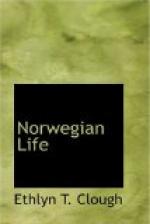CHAPTER III
SWEDEN IN THE NINETEENTH CENTURY
Leading up to the events of the nineteenth century in Sweden were centuries of splendid history, some points of which will be briefly touched upon to connect the present-day Sweden with the mediaeval state.
During the Folkung Dynasty, in the fourteenth century, the royal houses of Sweden and Norway became united through the marriage of Duke Eric, of Sweden, and Ingeborg, only child of King Haakon, of Norway; and Duke Valdemar to the king’s niece of the same name. In May, 1319, King Haakon died, and Magnus Ericsson, the young son of Duke Eric and Princess Ingeborg, inherited the crown of Norway, and July 8 of the same year was elected King of Sweden, at Mora in Upland.
For the attainment of this end, Magnus’ mother, Duchess Ingeborg, and seven Swedish councillors had worked with great activity. They had taken part in shaping the first Act of Union of the North in June, 1319, and from Oslo, in Norway, hastened to have Magnus elected at the Stone of Mora, where the Swedish kings since time immemorial were nominated. The Act of Union stipulated that the two kingdoms were to remain perfectly independent, the king to sojourn an equally long part of the year in each, with no official of either country to accompany him further than the frontier. In their foreign relations the countries were to be independent, but to support each other in case of war. The king was the only tie to bind them together.
There was another Magnus whose candidacy was spoiled by this union. He was the son of King Birger, already as a child chosen king of Sweden in succession to his father. Magnus Birgersson, a prisoner at Stockholm, was beheaded in 1320, to make safe the reign of his more fortunate cousin. King Magnus was only three years old, and Drotsete Mattias Kettilmundsson presided over the government during his minority, the nobles of the state council having great power and influence. Both in Sweden and Norway the nobility had by this time attained a supremacy which was oppressive both to the king and the people, not so much through their privileges as through the liberties they took. Their continual feuds between themselves disturbed the peace of the country.




